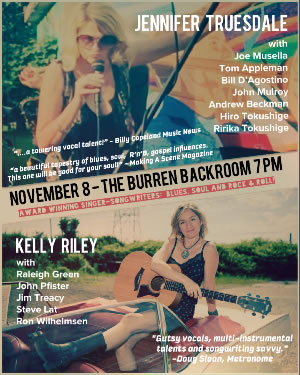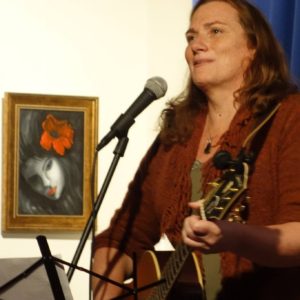
CiCi Eberle
Boston’s singer-songwriter CiCi Eberle has a lot to celebrate this Pride month. The openly trans woman singer-songwriter leads her life by being open and public about her lifestyle choice. She also gets the express her views and her feelings through her tools as a singer-songwriter. Formerly a rocker in the late 1960s Colorado music scene, Eberle has found acceptance in both her native Colorado and Massachusetts music scenes.
“Certainly here and in Colorado, absolutely,” she exclaimed She took some time off from music for a while but. got back to music in 2009
“I actually played at an open mic,” she said. “I knew I had to get back to it.” Now, age 64, she related how she bought her first guitar in 1968,
“I was an early 70’s rocker, Pink Floyd, Allman Brothers,” she said. “I used to play a lot of music on electric guitar. In about 2000, I was living in Colorado with family and I was working in the local library. In the folks section I found Dar Williams and Mary Gauthier.. That kind of hooked me onto the folk genre.”
Eberle relied on a classified page for mostly LGBT people. She found a band that was looking for a guitar player. Early in her transition, she wasn’t comfortable as a singer songwriter. She also had not played that much acoustic guitar.
“I ended up with three women from the queer community called Cynova that was a folk rock band and we played all over, Boulder, Pride festivals. That was a our community .”
“There were some clubs that were supportive,” she continued. “That was 2009 The economy turned more vanilla and Starbucksier. A lot of those good venues went out. But the scene I was playing was around Forts Collins where I was living.”
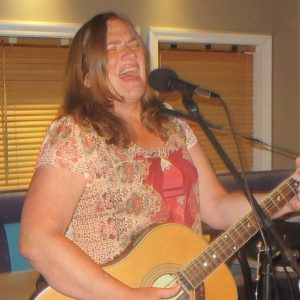
CiCi Eberle
As someone who got back into the folk music scene through the Queer music scene, Eberle found Boston to be a perfect second home. “Here it’s so normalized. There’s really are specific LBGT bars. Everybody here seems super accepting where I play. I’ve had a few discussion points where I had a chance to talk to people and educate them. Some people feel I’ve dropped a bomb on them when the get my back story.”
Eberle prefers to discuss LBGT issues with people when she meets them or has group discussions. Mostly, she does not write political action songs.
“I just write about whatever comes to mind,” she said. “What I can do is be out there in the public and be visible. We even have a band of fellow songwriters. We don’t actually call it a band. We call it a consolation called The Wedge Issues. We have performed several times at The Burren Back Room to large crowds”
The main difference Eberle has found between the Colorado Pride celebrations and the local Massachusetts Pride event is that Colorado involves its local musicians more. Here, there’s kind of a push back (against) what is perceived as a the Corporate pride event.
“The perception is that there is an uprising, a counter movement against the local business leaders. There’s a feeling here that the main pride that’s down in Boston, it’s just so corporate and sponsorship oriented.”
The big music event in the Hub, Boston Calling, bring in represent some of the LBGT community, but their program does not overlap at all into the LBGT folk music scene that Eberle is part of.
“The music that they chose to put on is not community driven,” she said. “It’s what they think will make a big splash. Its very upper generational. It’s music that’s targeted for a certain demographic of listeners. They aren’t the folk scene They’re not the singers-songwriter scene. I think they could use a singer-songwriter LBGT stage.”
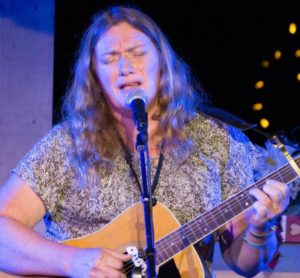
CiCi Eberle
When asked if she has ever been discriminated against in the music scene, she answered “Oh, that’s so hard to know. I don’t like to spend a lot of time wondering if I was discriminated against. I think I maybe discriminated against for certain reasons. I don’t know if it’s my trans-ness, or my age, my redheaded-ness, my full bodied-ness.. Maybe my music just doesn’t have that much appeal. I can’t differentiate that from being discriminated it.”
In the world outside of her venues and her singer-songwriter community, Eberle did face discrimination from the general public, especially early in her transition. While friends of her were hurt by it, Eberle took it more in stride.
“I’ve been out in public and people hoot and holler,” she said. “It’s happened a few times. I’m comfortable in my own skin and I feel lucky that way.”
Eberle said it’s taken a life time to find who she is. Singing in public helped her to realize she could sing as well as play electric guitar when she was young.
“When I came out as trans, I also came out as a basement musician back in the music world and that extra thick skin gave me the courage to get up there and do it.”
Eberle, according to her website, has quirky, offbeat humor in her songs. She had to learn to deadpan so she does not telegraph her punch lines. She has one song titled “Illegal In North Carolina” which is based on the bathroom bill passed in that state which lead to North Carolina being boycotted by major corporations and celebrities, Bruce Springsteen being the biggest name to cancel a concert there. In her song she asks why anyone would care who is in the next stall..
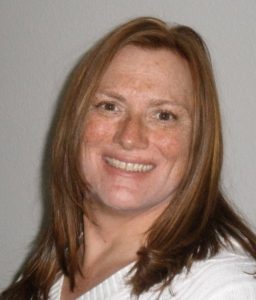
CiCi Eberle
“It’s been an interesting song,” she said. “It’s started a lot of dialogue.”
Her most inspired song “The Color Of Sunlight” was inspired by a book written by Michelle Alexander about a woman in a town in Montana that was about 10 years behind the times.
“It’s about the friendship that between Michelle the nurse and the blend trans woman she cared for,” Eberle said.
Without about 11 albums worth of songs bottled up inside her, Eberle has got some goals in mind. Only time will tell how far that new material will take her.
“I always want to play the next bigger stage,” she said. “Like all singer-songwriters, I’m always writing the next song, and wanting to find the emotional truth and make sure I connect.”

